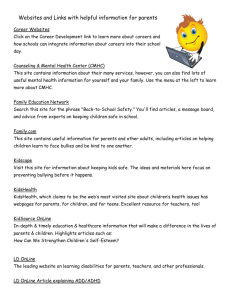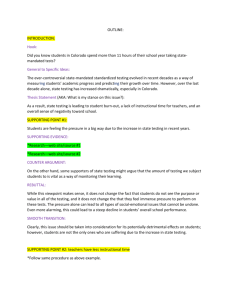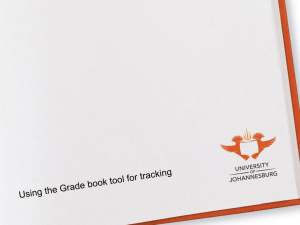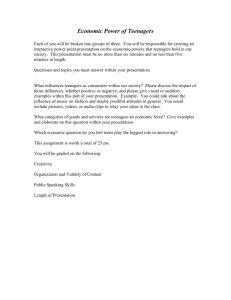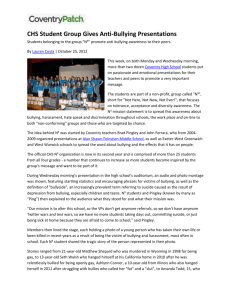Inquiry Project
advertisement
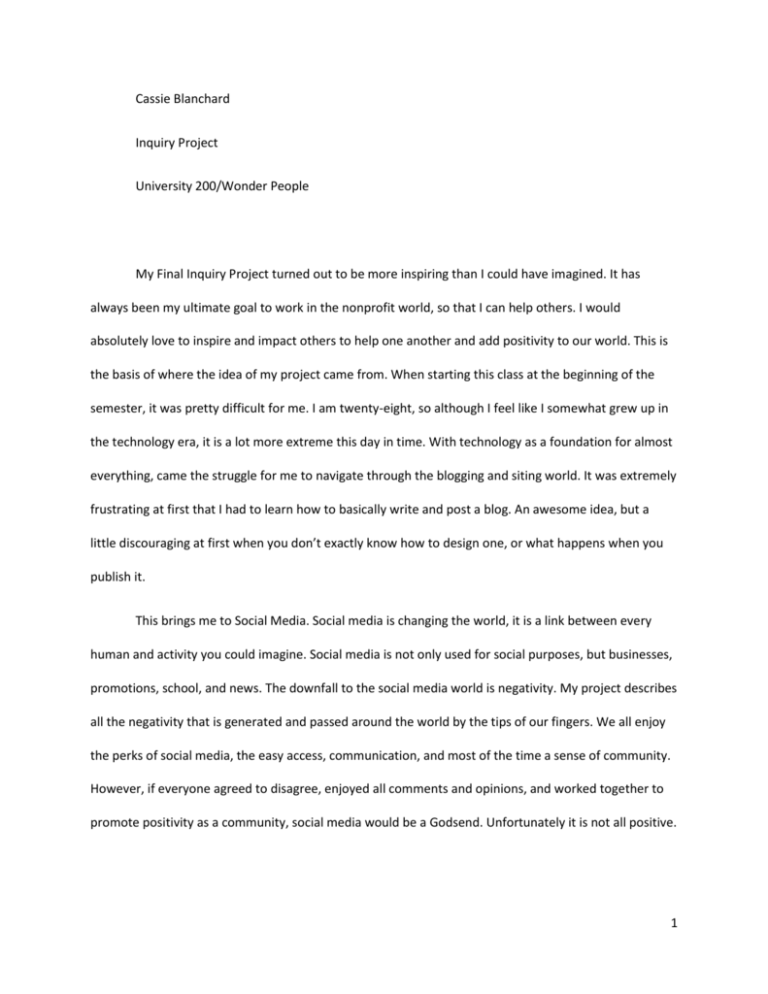
Cassie Blanchard Inquiry Project University 200/Wonder People My Final Inquiry Project turned out to be more inspiring than I could have imagined. It has always been my ultimate goal to work in the nonprofit world, so that I can help others. I would absolutely love to inspire and impact others to help one another and add positivity to our world. This is the basis of where the idea of my project came from. When starting this class at the beginning of the semester, it was pretty difficult for me. I am twenty-eight, so although I feel like I somewhat grew up in the technology era, it is a lot more extreme this day in time. With technology as a foundation for almost everything, came the struggle for me to navigate through the blogging and siting world. It was extremely frustrating at first that I had to learn how to basically write and post a blog. An awesome idea, but a little discouraging at first when you don’t exactly know how to design one, or what happens when you publish it. This brings me to Social Media. Social media is changing the world, it is a link between every human and activity you could imagine. Social media is not only used for social purposes, but businesses, promotions, school, and news. The downfall to the social media world is negativity. My project describes all the negativity that is generated and passed around the world by the tips of our fingers. We all enjoy the perks of social media, the easy access, communication, and most of the time a sense of community. However, if everyone agreed to disagree, enjoyed all comments and opinions, and worked together to promote positivity as a community, social media would be a Godsend. Unfortunately it is not all positive. 1 More people use social media than not and the percentage rates of users are increasing. According to the Pew Research Center seventy-two percent of adult users use Facebook, thirty-one percent use Pinterest, twenty-eight percent use Instagram, and twenty-three percent use Twitter. There are multiple social media sites and seventy-one percent of Teenagers use more than one social network site. What does this mean? Teenagers are at even more of a risk of accessibility by predators and bullies. Accessibility such as photos, videos, and personal information. Ninety-one percent of teenagers post photos of themselves, and twenty-four percent post videos of themselves. This enables people all over the world to view there profiles in seconds. Although more than half of internet using teenagers have decided not to post content online over reputation concerns, that leaves half that are not concerned about how they are portrayed or act towards others online. Are you scared yet? In my opinion, it is terrifying to know how many teenagers put themselves out there without realizing the repercussions. After conducting interviews with five adults who are parents, I have concluded the following. The biggest fears they have for their children using social media are; exposure to violence and negativity, bullying others, or being bullied, the risks of low self-esteem, overshared information, contact from harmful predators, connecting with strangers, identity theft, and sexual harassment. All of these are huge risk factors that are becoming harder to control as technology continues to thrive. To help protect their children from these risks all parents agreed to approve the web browsing of their children, set parental blocks, make daily time limits, and even have access to their passwords and search history. These are easy ways to help with privacy protection. When asking the group of parents their thoughts on using social media for school information they had a few disagreements. Most like the idea of the school using social media for updates, upcoming events, and alerts during emergent situations. Other parents felt it was unnecessary to use social media for school because it encourages their children to spend even more time using social forums. 2 Another important question I asked parents was, if they thought that social media has a positive or negative effect on their children’s self-esteem? Majority believed that it could have a positive influence, but that a negative influence could have extreme repercussions. The positive influence could be comments and compliments from friends and family members. Some children may receive encouragement from the community for accomplishments they may post. The negative concerns were the unrealistic portrayals of life and body images that may be posted online. One mother made an excellent observation of how so many pictures are now photo-shopped and distorted that a young girl may strive to be like something unrealistic. Unrealistic expectations through images and posts, and negative comments also raise concern. The final question I asked parents was how they would explain the importance of privacy to their children. All agreed that using examples of people who had been taken advantage of on social media was a way to show the importance of keeping their information private. One mom, the wife of a military officer said she stressed to her children how important their privacy was due to their Dad’s job in the military. Military families are at more of a risk using social media, due to job status, deployment and even identity theft. When in the military sometimes even families do not know exactly where a military member may be, due to safety reasons. If for some reason it is posted on social media, it could actually endanger their lives. I also know of an incident where a soldier was killed in Afghanistan and it was leaked onto social media before all family and friends were notified. How horrible to have to find something this traumatic out on a social media website. What I learned from these parents was that all of them are aware of the dangers of social media and are open to suggestions to prevent harm to their children. Everyone wants the best for their children, and any type of safety prevention is helpful. I also interviewed another group of people, women between the ages of eighteen and twentynine years old. Eighty-nine percent of this demographic use social media forums such as Facebook, Instagram, Twitter, and Pinterest. This group are the highest percentage users of Pinterest. Pinterest 3 being a forum that you can post just about anything, from workouts to recipes, from quotes and beyond. Most women agreed that their biggest concern using social media is overshared information, and the risk of strangers knowing too many intimate details. Even with privacy settings, there are now ways to find out information about others who use social media forums. Not only are they concerned with identity theft, but stalking incidents as well. According to victimsofcrime.org 7.5 million people are stalked in the United States in just one year. Social media gives dangerous means of accessibility and contact to people increasing the likelihood of being stalked. Think about how many friends you may connect with online. Next, think about how many friends those friends have and so on. Soon you are into thousands of people seeing your name, picture, and information. Now think of how many times you may have “checked in” to somewhere you were on Facebook. You have just notified thousands of people exactly where you are and when you are there. This is just inviting stalkers to follow you around, you are basically notifying them of everywhere you go. Self-esteem plays a huge roll in a women’s life and when asked how social media effects their self-esteem I got quite a split of negative and positive. Some said they feel social media is negative due to being scrutinized by others with negative comments, judged negatively on what they post, or discouraged by other women posting pictures of their “perfect” selves. The other half claimed that social media helps them gain confidence when encouraged or complimented by followers. Compliments and “likes” give them a bit of an ego boost. My next question had to do with how social media effects employment. Majority said social media was a great way to network and gain important connections in the business world. It is also beneficial in the sense that small businesses, and online businesses can advertise, promote, and even boost sales by using social media. The only downfall to social media versus employment is when something controversial is posted. Companies now use social media to do research on employees and potential employees. If something negative comes up that you have posted it could negatively affect your career. You also have to trust that your friends will not post anything that could 4 get you into trouble with an employer. Lastly, how many times have you seen someone post how much they hate their job or boss online? What if your boss comes across these comments? Lack of privacy is a concern in most people’s lives, especially with the increase in technology. I was surprised when asking the question about concern of lack of privacy on social media, that most were not too worried. Majority of the women interviewed stated that privacy settings and being able to choose what they post on different forums gave them a sense of comfort. One interviewee said she was extremely concerned because most downloads and programs seem to be unprotected and easily hacked. So many things are now backed up and auto saved, it can somehow, some way still be accessed. Imagine all the pictures you post that you forget about and are somewhere out there in the media world. Imagine how many emails you get with passwords and names. All of these can spread like wildfire. My last and most important question involves the negativity on social media. Everyone agreed that negativity on social media is out of control. Suggestions to help with these issues were, more strict regulations on the age of who can sign up for social forums, and regulations on comments, posts, and videos that are negative. It seems that just about anything can be posted online without going through some type of filter. This raises the concern for cyber bullying, and the risks of controversial posts. People seem to be much more courageous behind the screen of a computer and may post or express more negativity than they would in a one on one situation. Because a lot of things are not censored it is a huge risk factor for a young child or teenager to be scrolling through social media. One bad link or post can lead to hundreds of others. We could protect younger children from being exposed by not allowing them to have access or sign up for social media until a certain age. It would also be extremely beneficial if someone could regulate what is posted. If a negative video, picture, or comment is posted by someone they should be at risk to having there page completely shut down. 5 These leads to the importance and main topic of my inquiry project, that social media has introduced us to harsh influence of cyber-bullying, and negativity causing low self-esteem and depression. According to the Washington Post, low self-esteem is said to be killing young girl’s success around the world. Due in part to their lack of confidence and how much of their extra time is spent using forms of social media. Instead of using free time for school work or extracurricular activities, they are more concerned with what is happening in the media world. Cyber-bullying not only leads to low selfesteem but a larger concern, suicide. There has been a strong link between bullying and suicide, and with the usage of social media, a newer trend of cyber-bullying. The definition of cyber- bullying is as follows, “the use of electronic communication to bully a person, typically by sending messages of an intimidating or threatening nature.” According to the Center for Disease Control, suicide is the third leading cause of death, it results in about 4,400 deaths per year. Also stated is that students who experience bullying are twice as likely to have negative effects such as depression, anxiety, difficulty sleeping, and adjustment problems at school. Urban Institute’s study on bullying showed that seventeen percent of students are victims of cyber bullying. Suicide Awareness Voices for Education states that suicides among the ages of fifteen and twenty-four is the third leading cause of death for youth. One of 65,000 children ages ten to fourteen commit suicide every year. Over sixteen percent of students seriously consider suicide, thirteen percent create a plan, and eight percent have made a serious attempt. There are tons of horrible stories of teenagers who have acquired depressive symptoms from bullying that has led to low self-esteem or suicide. Most who have followed through with a suicide plan have left some sort of evidence and or note stating they were bullied by peers, whether in person or on the internet. Sixty-nine percent of teenagers have their own computer, or cell phone which gives them direct access to social media. The sad of this is, over eighty-one percent of teenagers admitted that it is easier to bully online. We all want social media to be a positive thing, it could do wonders for our lives, and the truth is, it is extremely dangerous. 6 The older I get, the harder life gets. There are added struggles and stress of daily life such as bills, work, family, school, and health concerns. Positivity is something that helps us get past these struggles and encourage one another to overcome the obstacles that may be upon us. The last thing anyone needs is to get online and be treated negatively or experience negative media. Some people do not take in to consideration or realize the extremely harmful effects that they have on one another by what they say or post online. A girl or women may be negatively affected by comments men make about what they think is beautiful and what they don’t. A man may be offended by someone posting something negative about politics or jobs. Parents may state an opinion about how they handle a situation with their child that others do not fully agree with. People just are not careful enough about what they post and what is not private. Just observing the actions of others while on my media accounts has made me want to do what I can to encourage positivity. My idea was to post a positive message myself and post it ont o my Facebook and Instagram accounts. Once I did this I encouraged my friends, and there friends to do the same. Little did I know how many amazing people would participate and spread positive vibes throughout the social media world. This to me proves we are all in the same boat. We all lead hectic lives and just need a little bit of positivity on a daily basis. Why knock each other down when we can pick each other up? More and more people continue to post positive quotes on Facebook and Instagram and the comments and likes are incredible! My first picture posted on Facebook with the quote that read, “A negative mind will never give you a positive life,” sending positive vibes received ninety-five likes and seven shares on Facebook and Instagram within twenty-four hours. Two days later fifteen people had posted their pictures with their positive vibes quote onto social media. Each of the fifteen people have at least 800 friends meaning that 12,000 people got to see the posts about positive vibes. 12,000 people got to see something positive. 12,000 people got to experience positivity and encouragement instead of negativity. 12,000 people in just a few days were influenced and inspired by others in a positive way. Small acts like these can make such a huge impact on our world. 7 My Inquiry project has taught me so much. I learned the dangers and crazy statistics of social media and cyber bullying. I was able to hear the opinions of twenty intelligent people, parents and nonparents and their opinions and concerns of social media. The greatest thing was that I got to experience the spread of positivity throughout social media proving that it is possible and people are willing to change the negativity on all of these forums. I am grateful for all the amazing things I learned doing this project and all the amazing people that helped me. I am now a firm believer that there are still great souls out there that want to effect the world in a positive way, just like I do! 8 Works Cited: Hyperlinks: http://nobullying.com/ https://img.washingtonpost.com/pb/resources/img/thewashingtonpost-white-2x.png http://www.npr.org/ References: https://www.victimsofcrime.org/docs/default-source/src/stalking-fact-sheet-2015_eng.pdf?sfvrsn=2 https://www.washingtonpost.com/news/wonk/wp/2015/03/08/how-low-self-esteem-is-killing-girlsacademic-success-around-the-world/?postshare=4591449116587064&tid=ss_mail http://nobullying.com/bullying-suicide-statistics/ Gharib,Malaka. 23 October 2015. Being 15 is Tough No Matter Where You Live: #15 Girls http://www.npr.org/sections/goatsandsoda/2015/10/21/450240416/being-15-is-tough-no-matterwhere-you-live 15girls?utm_source=facebook.com&utm_medium=social&utm_campaign=npr&utm_term=nprnews&ut m_content=2046 Interviewees: Rachel Lewis Lauren Wilkes Carter Feight Lauren Theobald Danielle Blanchard Megan Gilbert Emily Woodhal Aaron Ruggles Morgan Harler Kristin Farag Kristina George Kelly Jessup 9 Pictures: Lisa Williams, Amanda Landis, Kristina George, Kelly Jessup, Lauren Wilkes, Randy Taylor, Ryder Taylor, Eric Walker, Hope Walker, Kristin Farag, Kennedy Farag, Alexandra Zeidman, Jamie Bailey, Nancy Ayad, Ryan Berryman, Makennah Harler, and Leanne Harrow. 10

